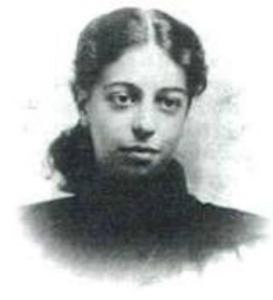
Mary Montgomery Booze
*Mary Montgomery Booze's birth is celebrated on this date in 1878. She was a Black teacher and public policy administrator.
Mary Cordelia Montgomery was born in Mound Bayou, MS., to parents who had been enslaved when she was young. She grew up in the Mississippi Delta. Her father, Isaiah T. Montgomery, was a cotton producer politically allied with Booker T. Washington. In 1887, the Montgomerys moved to Bolivar County south of Clarksdale in the rich delta of northwestern Mississippi. He founded an all-Black agricultural community, Mound Bayou, along the Mississippi River.
She was educated locally before going to New Orleans, Louisiana, where she studied for two years at the historically black Straight University. She returned to Mound Bayou and worked as a bookkeeper in the family business. She also taught at the teacher-training Mound Bayou Normal Institute. In 1901, she married Eugene P. Booze, who entered into a business partnership with his father-in-law. The Boozes had two children.
Despite state restrictions that effectively disenfranchised most Blacks, she joined the Republican Party. In 1924, she served as a committeewoman from Mississippi to the Republican National Committee, the first Black woman to hold that position. She became a subject of innuendo in fierce state politics during the 1928 presidential campaign that year. Governor Theodore Bilbo of Mississippi, a populist Democrat and supporter of his party's nominee, Governor Al Smith, claimed that the Republican candidate, Herbert Hoover, had danced with Booze in Mississippi; Bilbo described her as a "negress."
The rendezvous had supposedly occurred at Mound Bayou the previous year when Hoover, as the United States Secretary of Commerce, was in Mississippi inspecting damage from the Great Mississippi Flood of 1927. The all-Democratic Mississippi State Legislature had highly commended Hoover's work in flood relief after flooding devastated hundreds of thousands of acres in the Delta. The Shreveport Times of Louisiana ran a photograph of sixteen Republican national committeewomen, including Booze, under the heading "GOP for Racial, Social Equality."
Democratic U.S. Representative James B. Aswell of Louisiana's 8th congressional district, since disbanded, speaking on KWKH radio in Shreveport, criticized Hoover's support for desegregation of the American South. Hoover's southern supporters, most of them business-oriented Democrats, criticized Smith as a candidate, noting there was racial intermarriage in New York. Others opposed him because he was Roman Catholic. Bilbo's story may have been an attempt to rouse his conservative base.
Hoover polled only 17.8 percent of the vote in Mississippi, as whites then voted strongly Democratic, and most blacks were excluded from voting. South Carolina voters gave him only 8.5 percent of the ballot cast. However, in Alabama, Hoover finished with 48.5 percent of the ballots. After her father died in the late 1930s, Mary's sister, Estelle Montgomery, quarreled over the disposal of Isaiah's family property with Mary's husband, Eugene Booze. During a violent confrontation in 1939, Eugene called in state troopers. In the fracas, they shot and killed Estelle. Eugene was later shot and killed by an unknown assailant. The case was never solved.
After her husband Eugene's murder, Mary Booze moved to New York City, but she continued to hold the post of Mississippi Republican national committeewoman and to attend national conventions. The state party was controlled then by the Black and Tan bi-racial faction, led by the long-term national committeeman Perry Wilbon Howard of Jackson, Mississippi, who was effectively based in Washington, D.C. The rival Lily whites were in the minority in the party. Mary Montgomery Booze died in 1955.